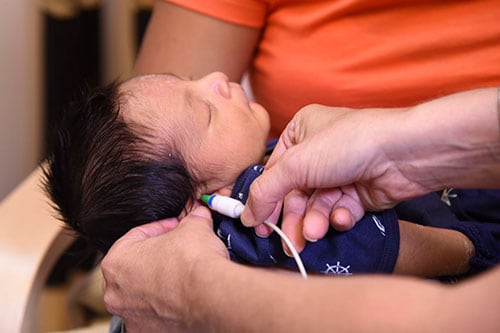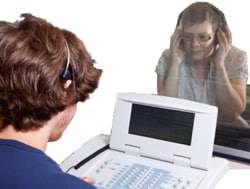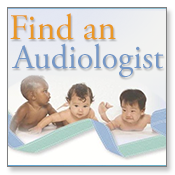Screening and Diagnosis of Hearing Loss

Hearing Screening
Hearing screening is a test to tell if people might have hearing loss. Hearing screening is easy and not painful. In fact, babies are often asleep while being screened. It takes a very short time — usually only a few minutes.
Babies
- All babies should be screened for hearing loss no later than 1 month of age. It is best if they are screened before leaving the hospital after birth.
- If a baby does not pass a hearing screening, it’s very important to get a full hearing test as soon as possible, but no later than 3 months of age.
Older Babies and Children
- If you think a child might have hearing loss, ask the doctor for a hearing test as soon as possible.
- Children who are at risk for acquired, progressive, or delayed-onset hearing loss should have at least one hearing test by 2 to 2 1/2 years of age. Hearing loss that gets worse over time is known as progressive hearing loss. Hearing loss that develops after the baby is born is called delayed-onset or acquired hearing loss. Find out if a child may be at risk for hearing loss.
- If a child does not pass a hearing screening, it’s very important to get a full hearing test as soon as possible.
Full Hearing Test
All children who do not pass a hearing screening should have a full hearing test. This test is also called an audiology evaluation. An audiologist, who is an expert trained to test hearing, will do the full hearing test. In addition, the audiologist will also ask questions about birth history, ear infection and hearing loss in the family.
There are many kinds of tests an audiologist can do to find out if a person has a hearing loss, how much of a hearing loss there is, and what type it is. The hearing tests are easy and not painful.
Some of the tests the audiologist might use include:
Auditory Brainstem Response (ABR) Test or Brainstem Auditory Evoked Response (BAER) Test
Auditory Brainstem Response (ABR) or Brainstem Auditory Evoked Response (BAER) is a test that checks the brain’s response to sound. Because this test does not rely on a person’s response behavior, the person being tested can be sound asleep during the test.
ABR focuses only on the function of the inner ear, the acoustic (hearing) nerve, and part of the brain pathways that are associated with hearing. For this test, electrodes are placed on the person’s head (similar to electrodes placed around the heart when an electrocardiogram (EKG) is done), and brain wave activity in response to sound is recorded.

Otoacoustic Emissions (OAE)
Otoacoustic Emissions (OAE) is a test that checks the inner ear response to sound. Because this test does not rely on a person’s response behavior, the person being tested can be sound asleep during the test.
Behavioral Audiometry Evaluation
Behavioral Audiometry Evaluation will test how a person responds to sound overall. Behavioral Audiometry Evaluation tests the function of all parts of the ear. The person being tested must be awake and actively respond to sounds heard during the test.
Infants and toddlers are observed for changes in their behavior such as sucking a pacifier, quieting, or searching for the sound. They are rewarded for the correct response by getting to watch an animated toy (this is called visual reinforcement audiometry). Sometimes older children are given a more play-like activity (this is called conditioned play audiometry).
With the parents’ permission, the audiologist will share the results with the child’s primary care doctor and other experts, such as:
- An ear, nose and throat doctor, also called an otolaryngologist
- An eye doctor, also called an ophthalmologist
- A professional trained in genetics, also called a clinical geneticist or a genetics counselor
For more information about hearing tests, visit the American Speech-Language-Hearing Association website.
Get Help!
- If a parent or anyone else who knows a child well thinks the child might have hearing loss, ask the doctor for a hearing screening as soon as possible. Don’t wait!
- If the child does not pass a hearing screening, ask the doctor for a full hearing test.
- If the child is diagnosed with a hearing loss, talk to the doctor or audiologist about treatment and intervention services.
Hearing loss can affect a child’s ability to develop communication, language, and social skills. The earlier children with hearing loss start getting services, the more likely they are to reach their full potential. If you are a parent and you suspect your child has hearing loss, trust your instincts and speak with your doctor.
